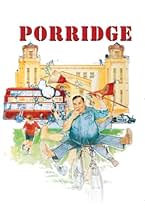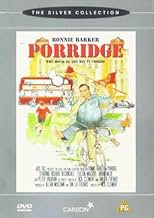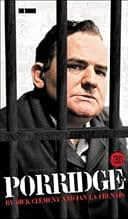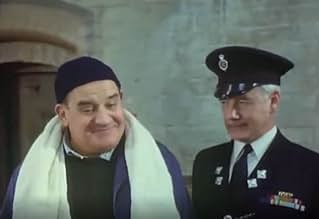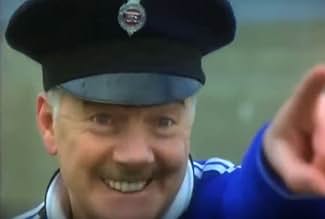Porridge
- 1979
- 1h 33min
VALUTAZIONE IMDb
7,2/10
3563
LA TUA VALUTAZIONE
Aggiungi una trama nella tua linguaFletcher is ordered to arrange a prisoner vs celebrity football game, unaware it's a diversion for an escape. Fletcher and cellmate Lennie accidentally discover the plan and must break back ... Leggi tuttoFletcher is ordered to arrange a prisoner vs celebrity football game, unaware it's a diversion for an escape. Fletcher and cellmate Lennie accidentally discover the plan and must break back into prison to avoid punishment.Fletcher is ordered to arrange a prisoner vs celebrity football game, unaware it's a diversion for an escape. Fletcher and cellmate Lennie accidentally discover the plan and must break back into prison to avoid punishment.
- Regia
- Sceneggiatura
- Star
- Premi
- 1 vittoria in totale
Gorden Kaye
- Dines
- (as Gordon Kaye)
Steve Steen
- Wellings
- (as Steven Steen)
Recensioni in evidenza
Porridge is a spin off film from the successful TV series of the same name that aired on British BBC1 between 1974 and 1977. It's directed by Dick Clement who also co-writes with Ian La Frenais. It stars Ronnie Barker, Richard Beckinsale, Fulton Mackay, Brian Wilde and Peter Vaughn.
Lets face it, and lets be honest here, for many Brits who grew up with the TV show, Porridge is simply one of the greatest shows Britain has ever produced. Sharp and on the money in writing and characterisations, and boasting a cast that were always irresistible, it still manages to enthral millions today during continuous reruns on cable and satellite TV. In light of the regard and popularity the show had, it was perhaps inevitable that a film production was just a matter of time, because, well, all the great British comedies of the past had feature films made. But of course not all were particularly any good.
So it's with much relief to find that the film version of Porridge is a very decent offering. The plot sees Fletcher (Barker) involved as the manager of the prison football team, to which, unbeknown to the wily old lag, is being used as a front for an escape attempt by Oakes (Barrie Rutter), and naturally the smarmy menace of Grouty (Vaughn) is pulling the strings. Fletcher & Godber (Beckinsale) then accidentally get caught up in the escape and thus have to break back into the prison before anyone catches them! This set-up is wonderful and makes for some very funny comedy, executed with aplomb by Barker, Mackay and co. True that taking the characters out of the confines of the prison strips away much of what made the TV series so special, but the characters are so strong, the actors chemistry so evident, film stands tall enough to not sully the reputation of the show.
It's a delightful way to spend an hour and half with your feet up, as a stand alone film it entertains those not familiar with the TV show. While for us fans? It sits nicely alongside the show as an extended viewing of comic genius behind and in front of the camera. 8/10
R.I.P. fellas, your legacy lives on always.
Lets face it, and lets be honest here, for many Brits who grew up with the TV show, Porridge is simply one of the greatest shows Britain has ever produced. Sharp and on the money in writing and characterisations, and boasting a cast that were always irresistible, it still manages to enthral millions today during continuous reruns on cable and satellite TV. In light of the regard and popularity the show had, it was perhaps inevitable that a film production was just a matter of time, because, well, all the great British comedies of the past had feature films made. But of course not all were particularly any good.
So it's with much relief to find that the film version of Porridge is a very decent offering. The plot sees Fletcher (Barker) involved as the manager of the prison football team, to which, unbeknown to the wily old lag, is being used as a front for an escape attempt by Oakes (Barrie Rutter), and naturally the smarmy menace of Grouty (Vaughn) is pulling the strings. Fletcher & Godber (Beckinsale) then accidentally get caught up in the escape and thus have to break back into the prison before anyone catches them! This set-up is wonderful and makes for some very funny comedy, executed with aplomb by Barker, Mackay and co. True that taking the characters out of the confines of the prison strips away much of what made the TV series so special, but the characters are so strong, the actors chemistry so evident, film stands tall enough to not sully the reputation of the show.
It's a delightful way to spend an hour and half with your feet up, as a stand alone film it entertains those not familiar with the TV show. While for us fans? It sits nicely alongside the show as an extended viewing of comic genius behind and in front of the camera. 8/10
R.I.P. fellas, your legacy lives on always.
Finally got this on disk the other month. And it was worth the wait. As an avid Porridge and Ronnie Barker fan, I thought the film done justice to a really funny series. Other movie spin offs have been mundane(On the Buses, for example), but this one was well written and well acted. Starring the original cast from the series (apart from Christopher Biggins), it continued Norman Stanley Fletcher's fight against the system. Even though it did contain a couple of jokes from the program, its a mere overlook to a really funny film. Even Fletcher with his little scams (McKays teeth bein gone example) have trasferred well to the big screen version. This is one film you wouldn't want to do time!
If you love the series this is based on you won't be disappointed (unlike some other tv to film adaptations). The scriptwriters have very smartly avoided the usual trap of taking the characters that work so well on the small screen and putting them in a ridiculous situation that so many other films (like On the Buses) have done with usually poor results. The photography does have a stark realism to it (it certainly looks very cold) and the colour scheme gives the film a certain bleakness but as the film is set in and around a prison it doesn't really take anything away and won't spoil the enjoyment of watching Fletcher and co get up to their normal tricks.
The story fits in well with the characters and settings. Almost all the familiar characters from the tv show are here and having Dick Clement and Ian Le Frenais write (who wrote the original tv series) write the film script keeps the continuity of characterisation and wit going. As usual Ronnie Barker totally steals every scene he is in, even against veteran character actors like Fulton Mackay and Peter Vaughan (as Grouty). The whole thing is an almost seemless transition from tv to silver screen with some wonderful funny dialogue and charming supporting actors thrown in (including a very young Daniel Peacock as a newly incarcerated inmate).
There is a sadness knowing that Richard Beckinsale passed away at the ridiculously young age of 31 just weeks after filming wrapped but at least the film doesn't dishonour his memory. As a swansong to him and as an adaptation to probably Ronnie Barker's most beloved character this film doesn't disappoint, even if the tv series is still marginally superior.
The story fits in well with the characters and settings. Almost all the familiar characters from the tv show are here and having Dick Clement and Ian Le Frenais write (who wrote the original tv series) write the film script keeps the continuity of characterisation and wit going. As usual Ronnie Barker totally steals every scene he is in, even against veteran character actors like Fulton Mackay and Peter Vaughan (as Grouty). The whole thing is an almost seemless transition from tv to silver screen with some wonderful funny dialogue and charming supporting actors thrown in (including a very young Daniel Peacock as a newly incarcerated inmate).
There is a sadness knowing that Richard Beckinsale passed away at the ridiculously young age of 31 just weeks after filming wrapped but at least the film doesn't dishonour his memory. As a swansong to him and as an adaptation to probably Ronnie Barker's most beloved character this film doesn't disappoint, even if the tv series is still marginally superior.
If you're going to make a film of Porridge, this is it. The nature of film demands a "big" storyline, and what could be bigger than the plot of this?
Some people have said that the film doesn't quite have the same zest as the series. That is true - but then it goes to show how amazing the series was, because this is one heck of a good film.
It has also been said that the plot (which I won't give away for people who haven't seen it) is weak. Here I disagree. The only minus point I have about the plot is the fact that the subplot about new arrival Rudge disappears about 2/3 of the way in. As for the main plot, see above. It's the only story you could do when making a film of Porridge!
OK, so the pace of the film is a little slow - BUT you must remember that some people watching the film aren't familiar with the TV series, so they had to set the scene first.
They could easily have re-used hundreds of scenes and lines from the series, but to their credit, they didn't - both Fletch and Godber are nearing the end of their stretches, and they brought in a new "first-offender", the aforementioned Rudge - that way, Fletch is able to dish out a little bit of advice to him the way he did to Godber in the series - again, to ease in "first time" Porridge-viewers.
When you consider the number of TV sitcoms that were adapted for the big screen, and how much the quality varied, the good ones stand out all the more. And this is one of the best.
Some people have said that the film doesn't quite have the same zest as the series. That is true - but then it goes to show how amazing the series was, because this is one heck of a good film.
It has also been said that the plot (which I won't give away for people who haven't seen it) is weak. Here I disagree. The only minus point I have about the plot is the fact that the subplot about new arrival Rudge disappears about 2/3 of the way in. As for the main plot, see above. It's the only story you could do when making a film of Porridge!
OK, so the pace of the film is a little slow - BUT you must remember that some people watching the film aren't familiar with the TV series, so they had to set the scene first.
They could easily have re-used hundreds of scenes and lines from the series, but to their credit, they didn't - both Fletch and Godber are nearing the end of their stretches, and they brought in a new "first-offender", the aforementioned Rudge - that way, Fletch is able to dish out a little bit of advice to him the way he did to Godber in the series - again, to ease in "first time" Porridge-viewers.
When you consider the number of TV sitcoms that were adapted for the big screen, and how much the quality varied, the good ones stand out all the more. And this is one of the best.
Dick Clement and Ian La Frenais seized the opportunity the 1970s genre of British sitcom movies offered. they took it, few other scriptwriters did. This was, namely, the chance to do on the silver screen what they could not do on prime-time BBC.
Lovable caricatures are subtly toned down here - Fletcher begins with the persona from the sitcom then changes. The quipping, upbeat Fletcher is revealed as a mask for the born loser/survivor he truly is.
The opening scenes where new character 'Grudge', a new, young inmate, is booked in and led around by the wardens could easily have been taken from John McKenzie's 'A Sense of Freedom'. Mckay, too, is deftly rendered a touch more three-dimensional. His mantra bemoaning the inmates' status as lower than normal people betrays his true feelings.
Peter Vaughan's Kray-like 'Grout' again all but turns to the camera and says "That's a cartoon version of me on the telly - I'm really a nasty piece of work'. The film very subtly does that which recent Brit comedy-turned-movie 'The League of Gentlemen's Apocalypse' deliberately attempted - the creation of real-world versions, far less comfortable versions, of the stalwart caricatures of the TV show's pantheon.
Lovable caricatures are subtly toned down here - Fletcher begins with the persona from the sitcom then changes. The quipping, upbeat Fletcher is revealed as a mask for the born loser/survivor he truly is.
The opening scenes where new character 'Grudge', a new, young inmate, is booked in and led around by the wardens could easily have been taken from John McKenzie's 'A Sense of Freedom'. Mckay, too, is deftly rendered a touch more three-dimensional. His mantra bemoaning the inmates' status as lower than normal people betrays his true feelings.
Peter Vaughan's Kray-like 'Grout' again all but turns to the camera and says "That's a cartoon version of me on the telly - I'm really a nasty piece of work'. The film very subtly does that which recent Brit comedy-turned-movie 'The League of Gentlemen's Apocalypse' deliberately attempted - the creation of real-world versions, far less comfortable versions, of the stalwart caricatures of the TV show's pantheon.
Lo sapevi?
- QuizThis is the last film appearance by Richard Beckinsale, who died during editing of the film.
- BlooperGodber declares that the model aircraft he's constructing is a Spitfire, but it's clearly a P51 Mustang.
- Curiosità sui creditiThe song over the final credits ends abruptly with the sound of a prison door being slammed.
- ConnessioniFeatured in Porridge @ 30 (2004)
- Colonne sonoreFree Inside
(uncredited)
Composed by Lem Lubin and Ian La Frenais
Arranged by Ray Russell
Sung by Joe Brown
I più visti
Accedi per valutare e creare un elenco di titoli salvati per ottenere consigli personalizzati
- How long is Porridge?Powered by Alexa
Dettagli
- Tempo di esecuzione1 ora 33 minuti
- Mix di suoni
- Proporzioni
- 1.85 : 1
Contribuisci a questa pagina
Suggerisci una modifica o aggiungi i contenuti mancanti


